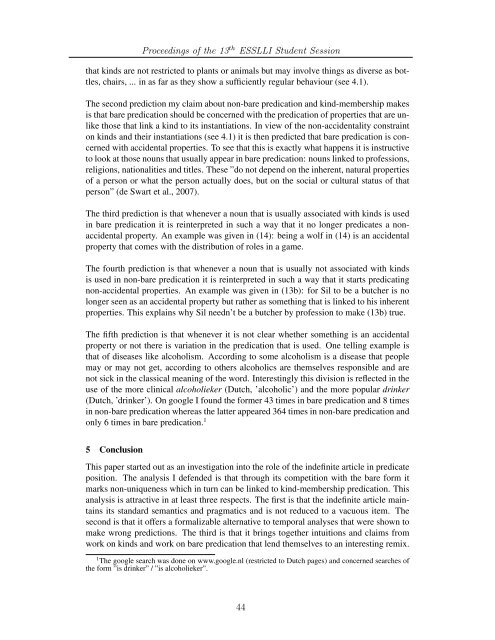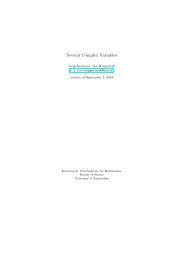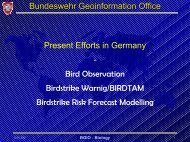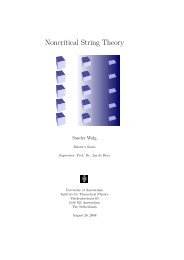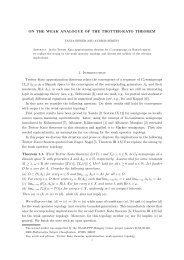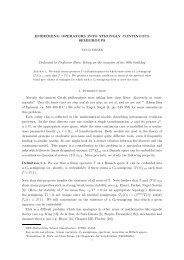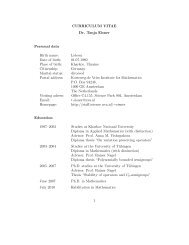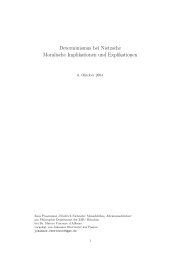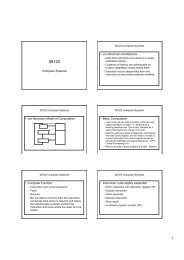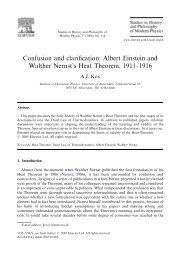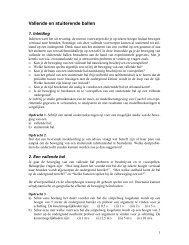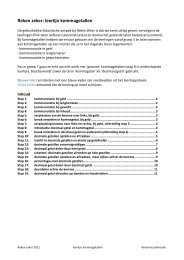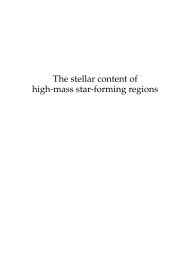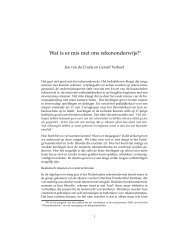Proceedings of the 13 ESSLLI Student Session - Multiple Choices ...
Proceedings of the 13 ESSLLI Student Session - Multiple Choices ...
Proceedings of the 13 ESSLLI Student Session - Multiple Choices ...
Create successful ePaper yourself
Turn your PDF publications into a flip-book with our unique Google optimized e-Paper software.
that kinds are not restricted to plants or animals but may involve things as diverse as bottles,<br />
chairs, ... in as far as <strong>the</strong>y show a sufficiently regular behaviour (see 4.1).<br />
The second prediction my claim about non-bare predication and kind-membership makes<br />
is that bare predication should be concerned with <strong>the</strong> predication <strong>of</strong> properties that are unlike<br />
those that link a kind to its instantiations. In view <strong>of</strong> <strong>the</strong> non-accidentality constraint<br />
on kinds and <strong>the</strong>ir instantiations (see 4.1) it is <strong>the</strong>n predicted that bare predication is concerned<br />
with accidental properties. To see that this is exactly what happens it is instructive<br />
to look at those nouns that usually appear in bare predication: nouns linked to pr<strong>of</strong>essions,<br />
religions, nationalities and titles. These ”do not depend on <strong>the</strong> inherent, natural properties<br />
<strong>of</strong> a person or what <strong>the</strong> person actually does, but on <strong>the</strong> social or cultural status <strong>of</strong> that<br />
person” (de Swart et al., 2007).<br />
The third prediction is that whenever a noun that is usually associated with kinds is used<br />
in bare predication it is reinterpreted in such a way that it no longer predicates a nonaccidental<br />
property. An example was given in (14): being a wolf in (14) is an accidental<br />
property that comes with <strong>the</strong> distribution <strong>of</strong> roles in a game.<br />
The fourth prediction is that whenever a noun that is usually not associated with kinds<br />
is used in non-bare predication it is reinterpreted in such a way that it starts predicating<br />
non-accidental properties. An example was given in (<strong>13</strong>b): for Sil to be a butcher is no<br />
longer seen as an accidental property but ra<strong>the</strong>r as something that is linked to his inherent<br />
properties. This explains why Sil needn’t be a butcher by pr<strong>of</strong>ession to make (<strong>13</strong>b) true.<br />
The fifth prediction is that whenever it is not clear whe<strong>the</strong>r something is an accidental<br />
property or not <strong>the</strong>re is variation in <strong>the</strong> predication that is used. One telling example is<br />
that <strong>of</strong> diseases like alcoholism. According to some alcoholism is a disease that people<br />
may or may not get, according to o<strong>the</strong>rs alcoholics are <strong>the</strong>mselves responsible and are<br />
not sick in <strong>the</strong> classical meaning <strong>of</strong> <strong>the</strong> word. Interestingly this division is reflected in <strong>the</strong><br />
use <strong>of</strong> <strong>the</strong> more clinical alcoholieker (Dutch, ’alcoholic’) and <strong>the</strong> more popular drinker<br />
(Dutch, ’drinker’). On google I found <strong>the</strong> former 43 times in bare predication and 8 times<br />
in non-bare predication whereas <strong>the</strong> latter appeared 364 times in non-bare predication and<br />
only 6 times in bare predication. 1<br />
5 Conclusion<br />
<strong>Proceedings</strong> <strong>of</strong> <strong>the</strong> <strong>13</strong> th <strong>ESSLLI</strong> <strong>Student</strong> <strong>Session</strong><br />
This paper started out as an investigation into <strong>the</strong> role <strong>of</strong> <strong>the</strong> indefinite article in predicate<br />
position. The analysis I defended is that through its competition with <strong>the</strong> bare form it<br />
marks non-uniqueness which in turn can be linked to kind-membership predication. This<br />
analysis is attractive in at least three respects. The first is that <strong>the</strong> indefinite article maintains<br />
its standard semantics and pragmatics and is not reduced to a vacuous item. The<br />
second is that it <strong>of</strong>fers a formalizable alternative to temporal analyses that were shown to<br />
make wrong predictions. The third is that it brings toge<strong>the</strong>r intuitions and claims from<br />
work on kinds and work on bare predication that lend <strong>the</strong>mselves to an interesting remix.<br />
1 The google search was done on www.google.nl (restricted to Dutch pages) and concerned searches <strong>of</strong><br />
<strong>the</strong> form ”is drinker” / ”is alcoholieker”.<br />
44


